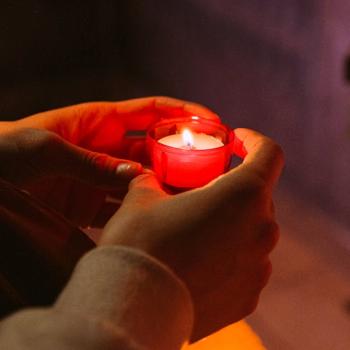In this state, souls are transformed in God. They are divine by participation and possess Christ-like qualities. In them the Redeemer has defeated Satan and his kingdom of darkness. Teresa and John of the Cross struggled with demons, but in the end their victory -- and God's -- was complete.
Some Theological Reflections on Demons and the Mystics
Any valid doctrine concerning demons presupposes faith, which presents to us the object of our belief -- in this case, demons. Just as we do not see God, we do not see demons. Any speculation on demons must be founded on sacred scripture, spiritual theology, and the experiences of saints.
- Teresa and John of the Cross believed, through faith, in the existence of demons. They could not doubt their existence. In addition, they experienced visions, locutions, apparitions, horrors, physical damage, temptations, and other manifestations of tile demonic. Some saints are subjected to these unusual demonic interventions, as was the case of Ignatius of Loyola, and in modern times, the Cure d'Ars.
- Demons are our adversaries, trying their utmost to hinder the journey of souls toward God. But demonic actions assume a special intensity, and are more subtle and stronger, when directed against advanced contemplative souls. These souls attract demons who desire to stop or at least slow down their progress toward God. The soul of a saint is the battleground between good and evil, between God and demons. After the soul of a saint reaches the seventh mansion, however, diabolic activity comes to an end, and the demons are afraid of them.
- Teresa and John of the Cross did not enjoy the benefit of our knowledge of psychology. But they were endowed with unusual discernment, and they knew that apparent demonic manifestations were often merely the result of mental illness or "melancholy." They also knew that demons use human weakness and adverse mental states as instruments for their temptations. Hence, it is not easy to discern when an apparent demonic temptation is merely psychological, and when it is both psychological and demonic.
Because the Spanish mystics were aware of the difficulty often involved in detecting the demonic, they recommended prayer to overcome the devil's "strength" as well as humility and recourse to God's light to discern the devil's "deceits." And modern discernment of spirits cannot afford to ignore modern psychology, but an exclusively psychological approach to those who appear to be affected by demonic influence is incomplete, and should be complemented by prudent theological discernment. St. Ignatius' rules for the discernment of spirits, for example, are a model of wisdom and experience. For advanced contemplative souls, the writings of Teresa and John of the Cross are very useful. In the Mountain, especially in book two, John of the Cross scrutinizes in detail the rules for the discernment of that which comes from God and that which comes from our own imagination or from the devil. In some of the chapters of her Life and the Interior Castle, Teresa complements John of the Cross' analysis with her own acute observations (Mansion 6, ch. 7 and 8; cf. Mansion 4, ch. 2 and 3). - Some confessors were certain that Teresa was possessed and should be exorcised. They were, as Teresa called them, "half-learned men," who did her much harm. Theologians, like Pedro Ibanez, Domingo Banez, Alvarez de Toledo, and saints, like Peter of Alcantara and Francis of Borja, never deceived her.
Pedro Ibanez, a famous theologian, who commanded Teresa to write her Life, applied the rules of discernment of spirits to Teresa, and she passed the test in each of his eleven strict rules. Allison Peers had the good sense to include these rules, and how Ibanez applied them to Teresa in the third volume of his Complete Works of Saint Teresa of Jesus (312-333). These rules are valid rules even in our times, for an authentic discernment of spirits presupposed the inspiration of the Spirit, as well as the help of a sound spiritual theology and a healthy psychology.
Naturally, any psychologist or theologian who a priori discards the existence of demons is not qualified to enlighten us on this problem, no matter how outstanding a scholar he or she may be. On the other hand, we must reject the work and writings of any modern theologian who ignores the benefits of psychology or finds demons in every neurosis.
As this article has attempted to demonstrate, a careful reading of Teresa and John of the Cross on demons may be profitable, particularly for Christians interested in contemplation and concerned with the discernment of spirits.
Works Cited
Crisogono del Jesus Sacramentado, OCD. Vida y Obras de San Juan de la Crus.
Madrid: Biblioteca de Autores Cristianos, 1974.
John of the Cross. The Collected Works of St. John of the Cross. Trans. by
Kieren Kavanaugh, OCD and Otilio Rodriguez, OCD. Washington, DC:
Institute of Carmelite Studies, 1979.
Ibanez, Pedro, OP. The Complete Works of St. Teresa of Jesus. Trans. by
E. Allison Peers. New York: Sheed and Ward, 1946.
Lepee, Marcel. "St. Teresa of Jesus and the Devil." In Satan. Ed. by
Bruno de Jesus-Marie, OCD. New York: Sheed and Ward, 1972.
Lucien-Marie de Saint Joseph, OCD. "The Devil in the Writings of St. John
of the Cross." In Satan. Ed. by Bruno de Jesus-Marie, OCD. New York:
Sheed and Ward, 1972.
Teresa of Jesus. Autobiography of St. Teresa of Avila. Trans. by E. Allison Peers.
Garden City, NY: Image Books, 1961.
____. Complete Works of Teresa of Jesus. Trans. by E. Allison Peers.
New York: Sheed and Ward, 1946.
____. Interior Castle. Trans. by E. Allison Peers. Garden City, NY: Image Books,
1961.
____. Obras Completas de Sancta Teresa. Madrid: BAC, 1974.
Tonquedec, Joseph de, SJ. "Some Aspects of Satan's Activity in this World."
In Satan. Ed. by Bruno de Jesus-Marie, OCD. New York: Sheed and Ward,
1972.
White, Victor. God and the Unconscious. Cleveland: Meridian Books: 1965.
Woods, Richard OP. "Satanism Today." In Soundings in Satanism. New York:
Sheed and Ward, 1972.
This article was first published at Spirituality Today and is reprinted with permission.
A native of Spain, Father Moreno OP, was a professor of philosophy, psychology and spirituality at the Graduate Theological Union at Berkeley. He passed away in 1995.




